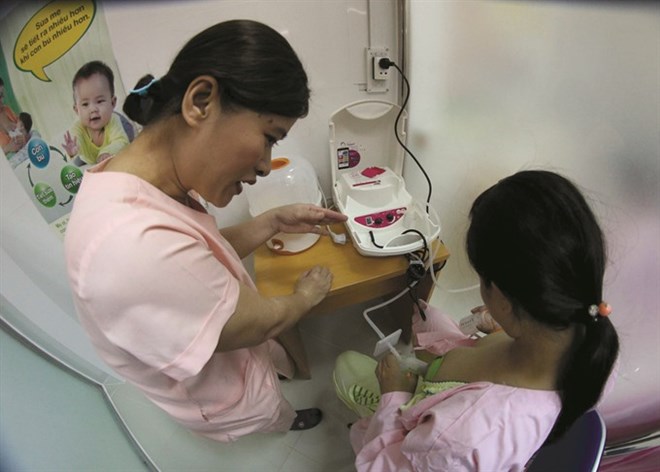Doctors warn mothers of donated breast milk use
(VNF) - Vietnamese women who are unable to breast-feed their children for health reasons are increasingly using donated breast milk from other women, sparking warnings from physicians.
Some mothers cannot breast-feed their children for various reasons, including the use of antibiotics taken after delivery.
Therefore, Le Huyen Trang, a woman from Tan Binh district, has set up a free “breast milk fridge” promoted on Facebook. Donors and recipients of breast milk can post their requests and information.
Every day, she receives between 60 and 80 breast milk bags with 250ml of milk from donors.
 |
Healthcare staff at the Da Nang Maternity and Paediatrics Hospital is instructing a mother who wants to give breast milk with a pumping machine. (Photo: VNA)
However, after reading media reports about the practice, Dr. Truong Huu Khanh, head of Paediatrics Hospital 1’s infectious and nervous diseases ward said, “It’s impossible to do this. It’s not like giving free rice or bread. Frozen breast milk from mothers should be used for their child only.”
Safety of a “breast milk bank” should be ensured, just as it is for a blood bank, Dr. Khanh said.
“It’s not sufficient to listen to donors who say they are healthy and have no disease. They must be tested for safety reasons,” he said.
Dr. Khanh said that opening and closing a fridge could also cause bacterial contamination.
At a recent press meeting, nutritionist Hoang Thi Tin of Paediatrics Hospital 1 said that breast milk from other mothers should not be encouraged.
Babies could be at a high risk of getting an infectious disease, she said.
Unfrozen breast milk must be used within two hours, she said, adding that milk bottles should be stored in the middle of a fridge’s freezer. Frozen milk at minus 70 degrees Celsius could be stored for around a year, she added.
Doctors at Tu Du Obtetrics Hospital also said breast milk from unknown donors could be contaminated with HIV, hepatitis B or C viruses. Patients with these diseases often do not have symptoms in the early stages of the disease and, as a result, affected mothers could pass along contaminated breast milk.
Moreover, techniques and devices for milk are sometimes not clean and storage is improper.
It is important to control the quality of donated breast milk by keeping it under surveillance by health experts and sterilising it, according to the American Academy of Paediatrics.
Mothers eligible to donate breast milk are tested to detect infectious diseases, and they should not smoke, drink wine or take any medicine that could affect the quality of the milk. They are also given instructions to ensure that the milk is not contaminated.
Donated milk is tested twice and is sterilised at a very high temperature. Milk that tests negative for bacteria or viruses is stored in a fridge for later use.
Earlier, a breast milk bank opened at the Da Nang Hospital for Women and Children on February 17th, aiming at providing milk for 3,000 – 4,000 babies per year.
The bank, the first of its kind in Vietnam, will collect, sterilise, test and preserve donated mother’s milk and provide it for disadvantaged infants while offering consultations on breastfeeding.
It will help all local children access to safe mother’s milk no matter what circumstances they are born.
The bank is also expected to lay a foundation for the Ministry of Health to expand the model to other medical facilities./.
( Compiled by VNF )
Recommended
 Handbook
Handbook
Vietnam Moves Up 8 Places In World Happiness Index
 Handbook
Handbook
Travelling Vietnam Through French Artist's Children Book
 Multimedia
Multimedia
Vietnamese Turmeric Fish among Best Asian Dishes: TasteAtlas
 Handbook
Handbook
From Lost to Found: German Tourist Thanks Vietnamese Police for Returning His Bag
 Handbook
Handbook
Prediction and Resolution for the Disasters of Humanity
 Handbook
Handbook
16 French Films To Be Shown For Free During Tet Holiday In Vietnam
 Handbook
Handbook
Unique Cultural and Religious Activities to Welcome Year of the Snake
 Handbook
Handbook
